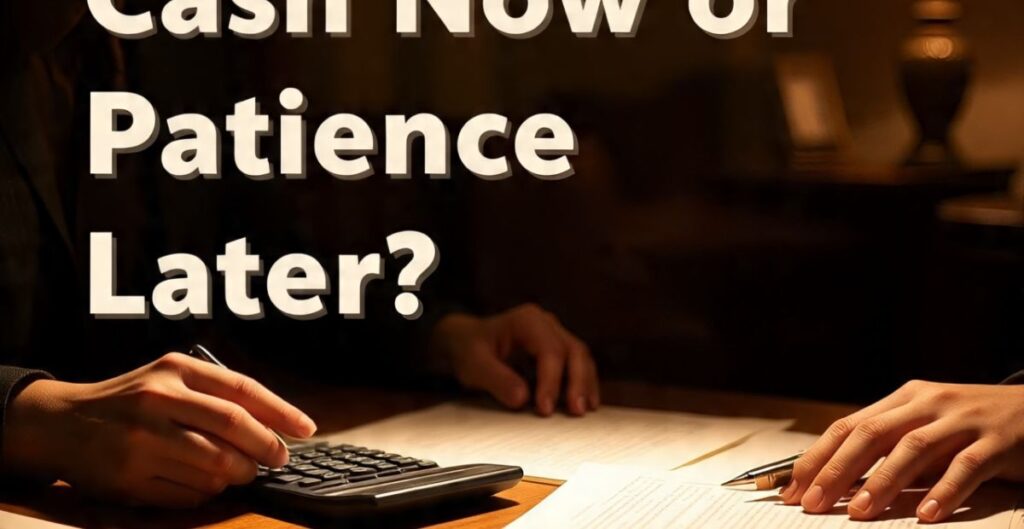Let’s Start With the Big Question: Why Wait for Money That’s Technically Yours?
You’ve got an annuity. Maybe it’s from a structured settlement, a lawsuit, a retirement payout, or even a lottery win (lucky you). And now, you’re staring at a monthly or yearly payment plan stretched out over decades. Sounds safe, sure—but does it feel helpful?

Let’s be real for a second. Life’s expensive. Emergencies don’t care about your payout schedule. Rent climbs. Cars break down. Opportunities show up, but they don’t wait.
So here’s the real talk: selling your annuity payments might not be for everyone, but if done right, it can be a game-changer. Not just a way to survive, but a way to flip the script.
What Is an Annuity, Anyway? (Without the Finance Jargon)
An annuity, in simple terms, is a financial contract. You or someone on your behalf gets paid in installments—monthly, quarterly, yearly—for a set period or life. Insurance companies usually manage them. Think of it as a “slow drip” piggy bank.
But here’s the catch: once that annuity deal is locked, it’s hard to just grab all your money and walk away.
Unless…you sell the rights to those future payments to a buyer, typically called a factoring company. They give you a lump sum now, and they collect the future payments instead.
Sounds simple? It kind of is. But there’s a little more under the hood.
Why Would Anyone Sell Their Annuity? (More People Do It Than You’d Think)
It’s not just about being in a financial pinch, though that’s a big one.
Here are some honest reasons people make the move:
- Debt is suffocating them: Credit card interest rates can burn through your income. Trading low-yield annuity payments for a lump sum to kill off high-interest debt can actually make financial sense.
- Business opportunity knocked: You’ve got an idea. You’ve got hustle. What you don’t have is startup cash.
- Medical bills don’t wait: Whether it’s yours or a family member’s, health emergencies can drain your soul and your savings.
- They want control: Honestly, some just want their money in their hands.
- Big life stuff: Buying a house, going back to school, helping family. Sometimes, waiting 20 years doesn’t work.
But—and it’s a big but—not everyone should sell. Let’s talk about that.
Should You Sell? Or Should You Chill?
There’s no one-size-fits-all answer. It really comes down to your situation and your mindset.
Here’s a little reality check list:
✅ Do you have a clear plan for the money?
✅ Are you facing serious, time-sensitive needs (like debt, bills, or investments)?
✅ Have you talked to a financial advisor or at least done the math?
✅ Are you okay getting less than the total value of your annuity?
If you’re nodding along, selling might just be the smart move.
But if you’re just bored or curious, or you think you’ll blow it all on a shopping spree… maybe pump the brakes.
Okay, So What’s the Catch?
Ah, yes—the part most companies kinda gloss over.
Here’s the blunt truth: you’re not going to get the full amount of your annuity.
Why? Because the buyer needs to make money too. So they’ll discount the total amount and offer you a lump sum that’s smaller than the full value of your future payments.
The percentage they keep? That’s the “discount rate”—and it ranges wildly. Some legit companies keep it at 8–12%, while shady ones can push it to 25% or more. That’s a red flag.
Translation? If your future payments add up to $100,000, you might only get $70,000—or less—depending on who you deal with.
Still worth it? Sometimes yes. Sometimes no. That’s where doing your homework (and reading this) pays off.
A Quick Story: The Guy Who Did It Right
Let me tell you about Amir.
Amir was 26 when he got a structured settlement after a bad motorcycle accident. Monthly payments of $1,500 for the next 20 years. Not bad, right?
But when his mom got sick and needed surgery that insurance wouldn’t fully cover, those small checks didn’t cut it. Amir sold half of his annuity for $65,000—enough to cover medical bills and still stash some for emergencies.
He kept the other half untouched, so he still gets a monthly income today. Smart move.
It wasn’t about greed. It was about strategy.
How to Sell Your Annuity Without Getting Screwed Over
You’ve probably seen the commercials—“Cash now for your structured settlement!” Yeah, we’ve all seen ’em. Some are legit. Some are, let’s say, questionable.
Here’s how to stay safe:
1. Shop Around
Don’t go with the first company you talk to. Get quotes. Compare them like you’re buying a used car—mileage, condition, value, the whole nine yards.
2. Ask for the Discount Rate
And if they won’t tell you? That’s your cue to run.
3. Read Reviews (Real Ones)
Trustpilot, BBB, Reddit—look for patterns. If everyone’s complaining about delays or shady practices, trust the crowd.
4. Involve a Lawyer or Financial Advisor
Even if it’s just for one meeting. It can save you thousands.
5. Negotiate
Yes, it’s negotiable. That lump sum isn’t always set in stone. Push back. You’d be surprised.
Common Myths—Busted
Let’s clear the air on a few things:
❌ “Selling means you lose everything.”
Nope. You can sell a portion of your annuity and keep the rest.
❌ “It’s illegal or sketchy.”
It’s totally legal—and regulated. But, like anything involving money, there are bad apples out there.
❌ “You won’t get court approval.”
Courts usually approve sales if they make sense financially. If you’re honest and prepared, it’s doable.
Real Talk: Is It About Money—or About Control?

Sometimes, it’s not just about how much money you’re getting. It’s about what that money means.
Freedom. Opportunity. Peace of mind.
Or maybe just the ability to breathe a little easier this month.
Money sitting in a locked box 15 years from now doesn’t help if you’re drowning today.
But here’s the flip side: once it’s gone, it’s gone. That slow drip can be a steady lifeline later in life. Don’t trade away your future for something fleeting now—unless it’s absolutely necessary or strategic.
The Bottom Line (With a Little Side Note)
Selling your annuity isn’t good or bad. It’s a tool. Like a hammer, it can build or break.
Used wisely, it can unlock a better life today. Used recklessly, it can turn tomorrow into a regret.
So before you make a move, ask yourself:
What am I trying to fix with this money?
If the answer is something meaningful—stability, opportunity, security—go for it. Just do it with both eyes open.
And if you’re still unsure?
Honestly, that’s okay too. Sometimes the smartest move is sitting tight while you figure things out. No shame in that.
Final Thought: Your Money, Your Move
If you’re still reading this? You’re already doing better than most. You’re thinking, not reacting. That alone puts you ahead of the game.
So, whether you cash out or stick it out, just remember: this is your call. Not your insurance company’s. Not your neighbor’s. Not even some fancy commercials.
Yours.
And when you make that choice with clarity, confidence, and caution?
You’re not just getting cash.
You’re taking back control.






